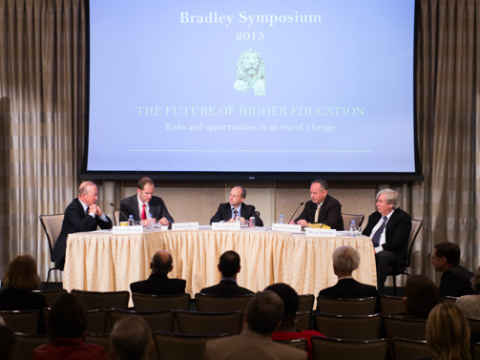
Stay under 40 percent default rate and you’re safe
WASHINGTON, D.C. – College students and their families suffer from poor consumer information about the value of their degrees, incompetent schools that keep getting federal money and plainly inefficient instructional methods, big thinkers in higher education told the Bradley Symposium Wednesday.
The event opened with a speech by Purdue University President Mitch Daniels, the former Republican governor of Indiana and onetime hoped-for presidential candidate, as The College Fix previously reported. The event was sponsored by the Bradley Foundation, Ethics and Public Policy Center and National Affairs.
Tuition growth has outpaced nearly every other service, according to Andrew Kelly, director of the Center for Higher Education Reform at the American Enterprise Institute. Only the “unprecedented” infusion of federal money into the system, mostly via Pell grants, has moderated tuition spikes, he said.
Wages for young male graduates have been stagnant or falling for more than a decade, and college dropouts today “look a lot like high school graduates” in their prospects, Kelly said. He cited Consumer Financial Protection Bureau figures that only 60 percent of grads are “actively repaying” their loans.
The ‘Enterprise Rent-A-Car problem’
Yet there’s still a huge wage premium between high school and college grads, including those with two-year or technical degrees, Kelly said. That’s illustrated by the “Enterprise Rent-A-Car problem,” he said, referring to a 2012 TV ad that showcased college athletes later working for the car-rental company.
If it takes a degree to work behind the counter at Enterprise, there’s something wrong with college, Kelly said.
One problem is that parents can undertake “unlimited borrowing” now to pay for their child’s education, representing around a quarter to a third of the family’s income, Kelly said.
“Lots of federal money flows to bad colleges” as well, because schools only lose their eligibility for federal money when the student default rate crosses 40 percent, Kelly said. It’s also difficult to learn which schools actually get sanctioned, he added: When consumers can’t gauge the return on investment (ROI) for college, it “blunts market discipline.”
Schools should be required to have “skin in the game” – take on some of the loan risk for students – to get federal money, and the feds should collect data on college ROI and open the data to third parties to create customized ratings, Kelly said. He called for the creation of a charter school-like movement to address the “tremendous lack of imagination” in higher ed.
Time to junk ‘time chunking’ of classes
Professors can streamline their lessons and improve student retention of material by incorporating more “on-demand” elements, according to Alex Tabarrok, an economics professor at George Mason University.
A co-founder of the educational platform Marginal Revolution University, Tabarrok said 20 percent of his students are typically “not following” his teaching, which means he repeats himself to the 80 percent who are. “In the online world you never repeat yourself” because students can rewind and fast-forward the lecture.
It’s time to get rid of “time chunking” for classes, just as people no longer have to watch TV programs in real time as laid out by TV Guide, Tabarrok said. There are “hundreds of studies” showing that online learning works for students “as least as well” as traditional studies, and it’s far cheaper: “Online models are the only plausible way to seriously reduce costs.”
Whether it’s using a robotic “AI tutor” to teach a student an individualized lesson plan or “adaptive textbooks” that “read you as you read it,” college courses should mimic videogames, keeping students “just on that edge between frustration and boredom,” Tabarrok said.
Tenured faculty aren’t the problem
Conservatives who complain that tenured faculty don’t teach enough and that faculty governance is like “collective bargaining” should realize they are giving administrators exactly what they want, said Peter Lawler, a government professor at Berry College.
Administrators are buying off tenured faculty – by giving them “research perks” and light teaching loads – precisely so that schools can hire more adjunct professors who are paid “less than subsistence” wages to teach the bulk of classes, Lawler said.
Schools are making themselves into commodities by removing courses like philosophy from the required load and replacing them with “competency” subjects, Lawler said. They then have to compete through “the amenities arms race,” shelling out for hotel-style dorms, gourmet food and “non-revenue generating Division III teams,” he said.
Lawler blamed the rise of “techno-light majors” such as exercise science and “beverage management” for creating students who graduate as “functionally illiterate” – and are not valued by employers.
Greg Piper is an associate editor at The College Fix. (@GregPiper)
Like The College Fix on Facebook / Follow us on Twitter
IMAGE: Greg Piper, James O’Gara Photography
Like The College Fix on Facebook / Follow us on Twitter








Please join the conversation about our stories on Facebook, Twitter, Instagram, Reddit, MeWe, Rumble, Gab, Minds and Gettr.